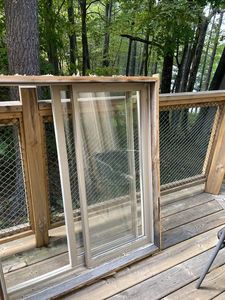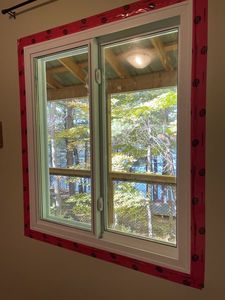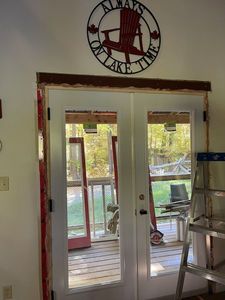Plain Tired
By Lorrie Potvin
Part I
4:35 p.m.
I’m just plain tired. I don’t usually write exhausted, but I want to be in the ‘best’ space to describe the chronic fatigue that bears on me. Not one spoon left today. (Spoon Theory by Christine Miserandino. Click here for the scoop on Spoon Theory.) It's a tiredness that can consume days, sometimes weeks and I’m powerless. It’s the kind of exhaustion that tires a person out from just thinking of doing something. Something as simple as writing this post.
It’s been said by some that to become the best writer you can be a person should write every day. I can’t. It’s an unreasonable ask. Brain fog prevents me from putting stuff together in clear, concise ways. The tiredness saps my motivation to even bother. Acceptance of this, like a balloon that has completely deflated, has been difficult for me. More so now that I’ve aged into my 60s. I seemed to be more tolerant of myself closer to my diagnosis of Multiple Sclerosis almost twenty years ago.
And it’s not just the impact chronic illness has on my writing. It’s being unable to socialize, attend community events, visit with the neighbours. Even the idea of calling someone feels like moving earth and I am unable to imagine picking up the shovel. But the worst is not being able to make art. I was a tradeswoman, a creator and maker long before I was a writer. Building and making soothes my being and makes me feel worthy.
Lack of worthiness leads me to depression. Sometimes, like a chicken before the egg or egg, you know the rest, I don’t know if I’m tired because I’m depressed or depressed because I’m tired. My head starts to swirl with overthinking and ultimately, I blame myself. I quit drinking and smoking when I was diagnosed with MS so the blaming, lack of energy, lack of production leads to food as my soother – pizza, pasta, chocolate, ice cream, cheesecake. A lengthy list, another battle, another story.
I need to go.
Part II
8:56 a.m.
Happy day folks,
Your CanLit News
Subscribe to Open Book’s newsletter to get local book events, literary content, writing tips, and more in your inbox
Mornings are good for me.
One thing I’ve learned when I’m fatigued to the point where I start “end of world” thinking, where I’m unable to visualize any kind of future for myself I’m just that tired, I don’t make any life changing decisions. In fact, I try not to talk with anyone for fear of sharing my impatience and anger, and then ultimately my grief, my sadness at not being enough. In TWUC’s Summer 2022 Write Magazine featuring pieces on disability and writing, Gabrielle Drolet writes, “While understanding and patience from others is important, it can be equally important for writers to extend the same understanding and patience to themselves – thought it’s not always easy.”
It's not been easy, especially on the mornings when I get up with just as much pain and tiredness as I went to bed with. Today isn’t one of those mornings although I am in some pain. The joint pain in my knees and shoulders never really goes away, it just diminishes with drug therapy, and then flares up when I am active regardless of any type of intervention.
Over the last couple of weeks, I have replaced three windows and a terrace door. I asked a couple of carpenters for help, dangling fuel costs and travel pay, but they were booked solid, and we needed the windows in before winter.
I started the job, removing interior and exterior trim, then used a reciprocating saw to cut out the windows I had installed myself alone 25 years previous. Paula helped me lift them out and then lift in the new ones. We faltered once. It wasn’t pretty, but we managed to grapple the window on to the sill with breathless grunts. We shared a high five afterwards as we were that close to dropping it.
The terrace door wasn’t within our ability to move safely. After disassembling and cutting up the old door frame I prepped the opening. The new door was larger, and I had to replace the jack posts and extend the header with an angle iron lintel. When ready I asked our neighbour farmer to come and help me lift it in. The best moment of the day was when he remarked, “it fits perfectly.” I soaked up his praise. The burning in my knees and faded as I stood a little taller with a grin.
Like with packaging up a writing project, I still have work to do. I’ve made a TO DO list parcelling it out in small doable chunks.
- Insulate around door
- Reinstall door hardware
- Install new door exterior trim, 1” x 6” rough pine, planed one side to 7/8” and paint black
- Install new door interior trim – wood or MDF? – paint white
- Reinstall interior trim on side window
- Reinstall interior and exterior trim on bedroom window
- Seal all windows and trim
- Clean up and organize tools
- Hook up trailer and load with old windows and doors – check re-use and dump hours
Breaking down the insurmountable, especially in the beginning times of a project, makes the impossible possible for me. Plus, I get great satisfaction from scribbling off the tasks when they are done, obliterating the letters with an extra flare, gotcha! A little bit of pumping my own tires and we all need to get some of that.
A writer friend, Arria Deepwater, who identifies as white, chronically ill and disabled, queer, feminist and faithfully middle-aged has a piece called Undertow coming out in November 2022 anthology from Stillhouse Press. It’s delightful, yet sad, a beautifully written reminder for us all.
In Between Spaces, Stillhouse Press’s first ever anthology, centers the experiences of thirty-three disabled poets, short-story writers, and essayists as they navigate the physical and emotional complexities of disability, chronic illness, neurodivergence, and mental illness. Compiled by an editorial team of disabled writers, this timely collection of often-overlooked voices celebrates joy, freedom, and the power of agency, while at the same time confronting and challenging the stigmas and barriers, visible and invisible, that too often come to define life with a disability.
The views expressed in the Writer-in-Residence blogs are those held by the authors and do not necessarily reflect the views of Open Book.
Tradeswoman, artist, writer, and teacher Lorrie Potvin, a queerishly two-spirited Métis, is the author of Horses in the Sand: A Memoir. Her first book, First Gear: A Motorcycle Memoir and the essays "My tattoos speak of life and loss" and "Why I’m thankful for multiple sclerosis" (The Globe and Mail), were published under her previous surname Jorgensen, as was the short story, "The 13th Dock" in Writing At Wintergreen, an anthology edited by Helen Humphreys.
Working and teaching in the trades for over 30 years, Potvin holds an Inter-Provincial Red Seal in Auto Body Repair and Refinishing from Algonquin College and a diploma in Technological Education from the Faculty of Education, Queen’s University, with additional qualifications in Manufacturing and Special Education. A citizen of the Métis Nation of Ontario, Lorrie lives on a lake north of Kingston in the area served by the High Land Waters Métis Council where she’s lived for 30 years, building her home and creating art made of stone, wood, hide and steel.





